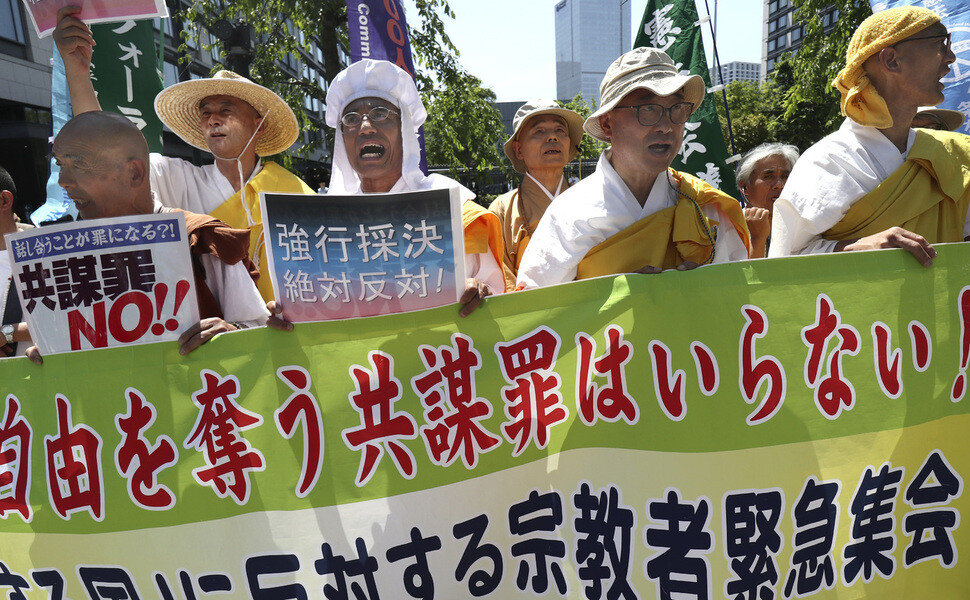hankyoreh
Links to other country sites 다른 나라 사이트 링크
Japanese gov‘t clashes with UN Special Rapporteur over proposed anti-conspiracy law

The Japanese government exchanged harsh words with a UN Special Rapporteur over a new anti-conspiracy provision that critics worry could turn Japan into a surveillance society.
At issue is a provision criminalizing “preparations for terrorism, etc.” that Tokyo is pushing to add to its anti-terrorism countermeasures legislation - an amendment of its Act on the Punishment of Organized Crime. Its terms would allow for punishment for actions at the preliminary and preparatory stages, even if the crime itself is not committed.
Joseph Cannataci, Special Rapporteur on the Right to Privacy for the UN Human Rights Council, dismissed the Japanese government’s protests over his own criticism of the criminalization as a potential threat to privacy, calling them “angry words” with “no substance,” the Tokyo Shimbun newspaper reported on May 23.
On May 18, Cannataci sent a letter to Japanese Prime Minister Shinzo Abe noting that the anti-terrorism countermeasure legislation could potentially “lead to undue restrictions to the rights to privacy and to freedom of expression.”
“The definition of what an ‘organized crime group’ is vague and not clearly limited to terrorist organizations,” Cannataci noted, adding that there was “no sufficient clarification on the specific definition of ‘plan’ and ‘preparatory actions.’”
In response to Cannataci‘s expression of concerns about arbitrary application of the law, the Japanese government sent a written letter of protest on May 19 by way of the office of the UN High Commissioner for Human Rights. According to Cannataci, the document argued that the conspiracy charges needed to be created for Japan to enter the Convention against Transnational Organized Crime and contained no reference to concerns about flaws in the legislation related to potential privacy infringements. On May 22, Japanese Chief Cabinet Secretary Yoshihide Suga denounced Cannataci’s letter to Abe as a “one-sided claim” that did not take the Japanese government’s position into account.
Legislation containing the provision in question was developed in 2005 and 2009, but stymied by objections from the opposition party, which expressed concerns about its potentially arbitrary use. Abe renewed the push as a terrorism prevention measure ahead of the 2020 Olympics in Tokyo. But many have found the content objectionable, with some saying it recalls the Public Security Preservation Laws instituted in the wake of World War II. Civic groups in particular have voiced fears that people could be targeted for investigation for exchanging information about demonstration plans over social media.
Abe passed the legislation over opposition party objections at a May 23 regular session of the House of Representatives and is currently planning to begin a House of Councillors review on May 24.
By Cho Ki-weon, Tokyo correspondent
Please direct questions or comments to [english@hani.co.kr]

Editorial・opinion
![[Column] Park Geun-hye déjà vu in Yoon Suk-yeol [Column] Park Geun-hye déjà vu in Yoon Suk-yeol](https://flexible.img.hani.co.kr/flexible/normal/500/300/imgdb/original/2024/0424/651713945113788.jpg) [Column] Park Geun-hye déjà vu in Yoon Suk-yeol
[Column] Park Geun-hye déjà vu in Yoon Suk-yeol![[Editorial] New weight of N. Korea’s nuclear threats makes dialogue all the more urgent [Editorial] New weight of N. Korea’s nuclear threats makes dialogue all the more urgent](https://flexible.img.hani.co.kr/flexible/normal/500/300/imgdb/original/2024/0424/7317139454662664.jpg) [Editorial] New weight of N. Korea’s nuclear threats makes dialogue all the more urgent
[Editorial] New weight of N. Korea’s nuclear threats makes dialogue all the more urgent- [Guest essay] The real reason Korea’s new right wants to dub Rhee a founding father
- [Column] ‘Choson’: Is it time we start referring to N. Korea in its own terms?
- [Editorial] Japan’s rewriting of history with Korea has gone too far
- [Column] The president’s questionable capacity for dialogue
- [Column] Are chaebol firms just pizza pies for families to divvy up as they please?
- [Column] Has Korea, too, crossed the Rubicon on China?
- [Correspondent’s column] In Japan’s alliance with US, echoes of its past alliances with UK
- [Editorial] Does Yoon think the Korean public is wrong?
Most viewed articles
- 1[Column] Park Geun-hye déjà vu in Yoon Suk-yeol
- 2Thursday to mark start of resignations by senior doctors amid standoff with government
- 3[Editorial] New weight of N. Korea’s nuclear threats makes dialogue all the more urgent
- 4Will NewJeans end up collateral damage in internal feud at K-pop juggernaut Hybe?
- 5Why Korea shouldn’t welcome Japan’s newly beefed up defense cooperation with US
- 6[Guest essay] The real reason Korea’s new right wants to dub Rhee a founding father
- 7Kim Jong-un expressed ‘satisfaction’ with nuclear counterstrike drill directed at South
- 8[Column] ‘Choson’: Is it time we start referring to N. Korea in its own terms?
- 9N. Korean hackers breached 10 defense contractors in South for months, police say
- 10[Column] Yoon’s first 100 days should open our eyes to pitfalls of presidential system